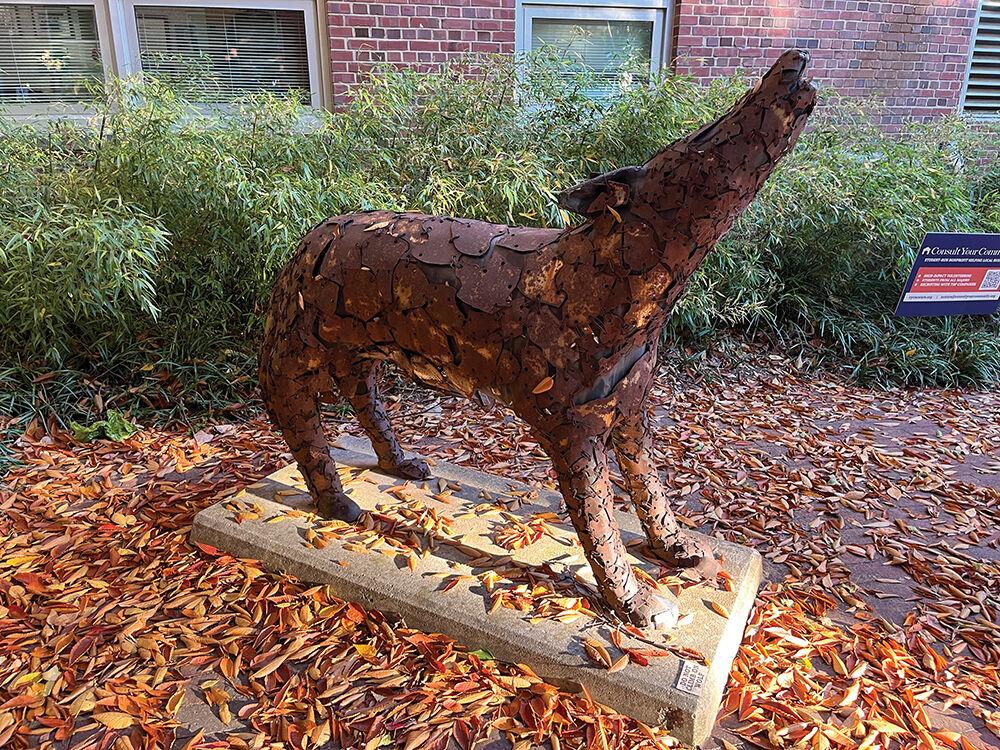On Nov. 12, the Poole College of Management (PCOM) unveiled a mural behind Nelson Hall in honor of Native American Heritage Month. Chelsea Locklear, the artist behind the work and an alumnus of NC State, presented the mural alongside Tayah Butler, PCOM director of diversity, equity and inclusion.
Locklear, a member of the Lumbee tribe of North Carolina, has two additional murals in Nelson Hall — one on the third floor, and another in Butler’s office. All three artworks are connected to Indigenous groups, boosting visibility and awareness of the Native American community on campus.
“Most people probably do not realize that North Carolina has the largest Indigenous population east of the Mississippi River,” Locklear said. “You don’t realize actually how many Indigenous people live in North Carolina, although we make up less than 2% of the population.”
Locklear’s mural outside of Nelson Hall features a large pinecone patchwork, layered with strawberries and corn, among other things — two foods that are commonly found in kitchens across the country, but actually have their origins in Indigenous culture.
“A lot of the takeaway from this should be thinking about, ‘Oh, these are all foods I eat every day’ and thinking about how these foods are actually Indigenous foods,” Locklear said. “I get to enjoy my corn on the cob during the summer, when it’s fresh, because of thousands of years of Indigenous seed-keepers cultivating these crops.”
Additionally, a wolf in the bottom-left corner of the mural draws connections to Locklear’s alma mater and the very university housing the artwork, NC State.
“What I appreciate about this outdoor mural is the connection Chelsea made in themes that most of us recognize as a part of our regular experience [of] North Carolina,” Butler said. “And how she was able to easily help us see that we can be thankful for those things because of Indigenous history.”
The mural was unveiled on a beautiful fall day, the colorful leaves complimenting the artwork wonderfully. Shades of teal, terracotta, light blue and yellow made for an autumn-inspired color palette, and no matter how many times you looked at the mural, you always found something new.
“There are just so many easter eggs … of things that you see in North Carolina that you don’t associate with Indigenous culture,” Locklear said. “And maybe you even associate corn on the cob with Southern culture, but really, that’s Indigenous culture.”
Locklear’s artwork is the latest in a line of annual visual displays from PCOM to honor Native American Heritage Month on campus. According to Butler, the mural will stay up for the foreseeable future.
“It’s also been really important to me as the director of diversity, equity and inclusion that we’re recognizing our Native American students throughout the year,” Butler said. “We’ve had a land acknowledgement up on the second floor, and we’ve recently redesigned it and we’re going to have it reinstalled.”
On the third floor of Nelson Hall, visitors can take a look at Locklear’s mural highlighting Missing and Murdered Indigenous Women (MMIW), a human-rights crisis affecting Indigenous women in the United States and Canada.
“Over the past few years, this has really become — with the rise of Instagram and TikTok and Facebook, we’ve really been able to kind of put this movement out there and, hopefully, gain a lot more traction of ‘Why aren’t our women being covered?’” Locklear said.
And speaking of social media, students interested in raising awareness of Indigenous culture long after Native American Heritage Month ends should aim to supply themselves with more information, even if only in their TikTok feeds.
“I think it can be as simple as following more Native American artists on your Instagram, follow Native American activists on TikTok,” Butler said. “Follow NC State’s Native American Student Union — I mean, their voices are out there, and it’s actually really accessible to be able to go add that to your feed.”
Students are more than welcome to visit Nelson Hall to check out any of Locklear’s murals in honor of Native American Heritage Month. To learn more about MMIW in North Carolina, visit the Missing Murdered Indigenous Coalition of NC’s website.














